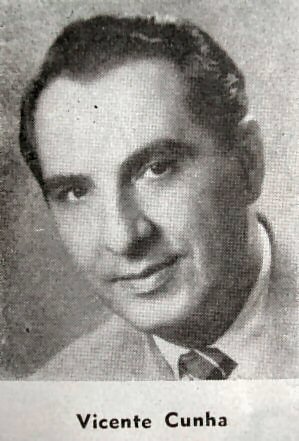Cunha was born in the state of Pernambuco in north-east Brazil, and spent his whole life there. In the mid-1920s, he became a
popular radio and music hall singer in Pernambuco's capital Recife. He was the house tenor of Recife's legendary radio station
Radio Clúbe.
Pernambuco was a backwater with a strong feeling of inferiority towards Brazil's south with Rio and São Paulo; theaters
and concerts featured southern artists only, and the thought of domestic stage artists from Pernambuco seemed far-fetched. Yet
that was exactly the aim of Samuel Campelo and Elpídio Câmara, when in 1931 they founded the "Grupo Gente Nossa": a
group that was to produce theater for the uneducated people of Pernambuco, with artists from Pernambuco: theater for the price
of a movie ticket. They wrote their own pieces, and they produced straight theater, vaudeville and operetta, and all that at
Recife's most important theater, the Teatro de Santa Isabel (plus on tour throughout the state of Pernambuco as well as in
neighboring states). The group existed until 1944, and for their entire period of activity, Vicente Cunha was their tenor. At
the same time, he continued to sing at Radio Clúbe, too.
Cunha was an amateur when he joined Gente Nossa, in the double sense of the word: he had never had any formal training (and I'm
not sure whether ever got any), and singing would always remain his second job; for bread and butter, he worked for the Great
Western Railway Company, and later at the customhouse in Recife. His singing was so successful that he was also hired by the
famous theater troupe of Viriato Correia (from the south of the country, but touring all of Brazil). But he steadfastly declined
offers from Rio de Janeiro and even from Buenos Aires: he absolutely wanted to stay in Pernambuco.
Pernambuco operettas he appeared in at the Teatro Santa Isabel were, for instance, Cabocla bonita by Henrique Vogeler
(February 1932),. Coração de violeiro by João Valença (March 1935), Noites de Novena
by the same composer (August 1938) or Bob Bobete by Valdemar de Oliveira (1940).
But he was of course not primarily an operetta but a folk pop singer. As such, he was closely connected to a legendary composer
and pianist from Pernambuco, Amélia Brandão Nery, lovingly nicknamed Tia Amélia (Aunt Amélia).
Cunha sang many of her songs, and they appeared also in concert together (even in Rio de Janeiro at the Teatro Lyrico, 11
August 1930).
Cunha's career was long, and his voice remained remarkably untouched by age (a rarity especially for such a light tenor). The
first three of the above recordings were made in July 1930; hearing the fourth, you wouldn't guess that it's from May 1961
– almost 31 years later!
Reference 1: Ana Carolina Miranda Paulino da Silva: O grupo Gente Nossa e o movimento teatral no Recife
(1931–1939), thesis, Recife 2009; reference 2; reference
3: Continente, 1 August 2011; reference 4; reference 5; reference 6: O Paiz, 10 August 1930
